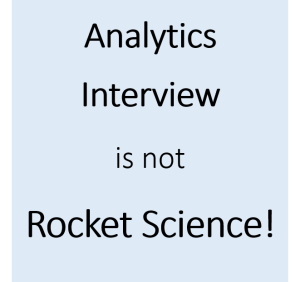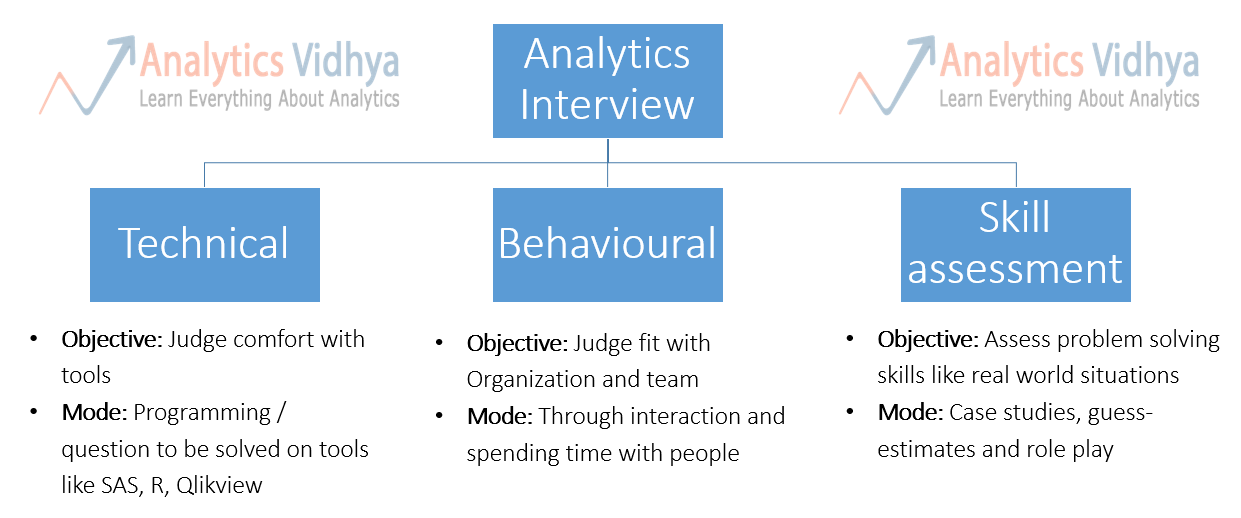Definitive guide to prepare for an analytics interview
Looking to land your first data science role but struggling to clear interviews? We have curated the most comprehensive course to ace your next data science interview. Hundreds of questions, plenty of videos, and multiple resources – the ultimate course!
Let’s face it! Facing an analytics interview can be daunting at times!
I have met a lot of analysts, who are good analysts when you interact with them informally. But something happens to them, as soon as they enter into an interview!
Have you seen one of these analysts and wondered what happens to them in the room? Or have you faced this situation yourself? This guide is meant to help you / your friend to ace the next analytics interview!
The first thing to keep in mind before appearing analytics interview is:
As long as you know your subject, are a logical person and can stay calm – you can ace these interviews easily!
What is the employer trying to judge you on?
The actual skills, which the employer might be judging on, would vary from employer to employer, but it is likely a mix of the following skills:
- Technical skills – comfort and knowledge about various analytical tools
- Knowledge of statistics – whether you apply algorithms blindly or actually understand what they do?
- Structured thinking – Can you take ambiguous problems and put a framework around them?
- Business understanding – How well can you put on your business thinking hat?
- Problem solving – Can you provide (out of the box) solutions to problems?
- Communication skills – Can you communicate your thoughts clearly and crisply? Can you influence people?
- Comfort with numbers – How good are you at crunching them?
- Attention to details – Do you pay attention to small details and at them up to see the bigger picture
This article can help you understand the perspective of an employer in some more details.
Types of analytics interviews:
Analytics interviews can be divided in broadly three categories:
The preparation for technical analytics interviews happens over time. These interviews test how much time and efforts have you put, in learning your subject and tools.
If you are really good at what you do, these rounds should be a cake walk. If you are not, the best strategy is to be honest about what you know and what you don’t and let your potential employer know. Here are a few articles to help you with technical interviews:
There is a lot of material available on the internet to prepare for behavioural interview, hence I would skip those details.
Skill assessment interviews:
These are the deciding factor in most of the analytical hiring, and for a good reason – if a person has sound logical skills and can demonstrate good business thinking and logical skills – he can pick up technical skills easily! Since these interviews are aimed to assess various skills, what matters more, is that you demonstrate those skills. The actual answer and solution is irrelevant in most cases. Any hiring manager would prefer a wrong answer with a better approach rather than an accurate answer with bad approach.
Skill interviews, again can be categorized in 2 categories:
- Guess estimates
- Case studies and role plays
Guess-estimates:
Guess estimates are puzzle like questions, where you are expected to estimate a figure by putting a framework to a question, creating segments, making assumptions and adding up the numbers to arrive at a number.
You can read details on how to ace a guess-estimate along with a few examples here. Here are a few tips I would recommend:
- It is the approach that matters – not the exact numbers. However, you should cross-validate numbers once you have them.
- Always go top down to solve a problem. Draw neat segmentation & diagrams to illustrate your approach.
- Keep a few common starting points / proxies on your finger tips. Population of your country, population across the globe, the GDP of your country are a few good starting points you should definitely remember.
- Analyze all possible uses of the subject. E.g. You should consider B2B & B2C markets, if you are asked to estimate market of tablets or smartphones.
- Call out assumptions and possible blind spots.
Case studies / Role plays:
Here is what Capital One says about case studies on its website:
Case interviews are broad, two-way discussions rather than one-way tests. You will be assessed more on how you go about dealing with the problem rather than on the specific answers you come up with.
A case typically starts with a broad question providing a business scenario and then narrows down in a particular direction. Cases might also evolve and grow in complexity as the interview progresses. Here is how a typical interview evolves over time:
Here is an example of a typical case study interview. Here is another one.
Following are some best practices to follow in a case study round:
- Case study is all about illustrating 3 things – Structure, structure and structure! Focus on putting framework to the problem provided, and you will be safe. Try deviating from it and you’ll find yourself in trouble.
For example, when asked how can you increase Profits for a product company, you should not jump to conclusions like “I’ll improve marketing or I’ll cut costs”. You should say Profits = Revenues – Costs. In order to increase profits, we can either increase Revenues or reduce costs. Revenues can be increased by increasing Sales or increasing the price. Costs can be reduced by doing ….
Keeping a structure will not only help the interviewer understand you better, it will also help you make sure that you have not missed out any thing.
- Call out assumptions, whenever you are making them. These could be assumptions about business or the sector in discussion.
- Lay out things neatly on paper, such that, they can be re-used later. Most of the times, case studies evolve over time. You will be asked to do similar questions, multiple times under multiple scenario. Keeping them handy can reduce calculation time!
- Think out loud – it is the thinking process, which matters. If you are not sure – ask the interviewer rather than staying quite!
- Communicate crisply and clearly – if you are not clear about your thoughts, take 2 minutes from the interviewer to arrange your thoughts and then communicate them nicely.
Finally, here is a list of activities / behaviour, you should avoid during the interview. These, along with the best practices mentioned above, should give you enough ammunition to handle any analytics interview.
What do you think about this guide? Do you have handy tips and tricks, which helped you in your interviews? Please share your thoughts and practices through comments below. I am looking forward to hear them.
If you like what you just read & want to continue your analytics learning, subscribe to our emails, follow us on twitter or like our facebook page.
image credit: Oregon State University














I am thinking right now that you have heard my wish :) I will be facing case studies interview on 9th July. I was learning how to solve case study, business problem cases and guesstimates question. After reading this article, I am having a clear picture now on how to ACE in CASE... Thanks a ton Kunal sir.
All the best Vishwash! Do share your experience, once you have faced the interview.
Hi sir, Can i get some pdf guide comprising of all above sample eg's. If not, any book that i can refer for case studies,business cases,guestimates specific to analytics interviews.
Sahil, Stay tuned for a few days. We will provide this resource in some time. Regards, Kunal
Hi Sir, This has been immensely helpful! I am a second year MA Economics student with experience in R, ideally looking out for a career in Analytics. If you could tell me the level of difficulty in questions that I might face? Should I be expecting a highly statistics oriented questions? Regards
Thanks for sharing these great tips on how to ‘ace the case’! I’m about to begin preparing for MBB interviews and found these tips to be a good starting point. Another tip, which might be helpful, is to apply the MECE principle (mutually exclusive and collectively exhaustive) for structuring an issue tree: http://www.preplounge.com/de/bootcamp.php/case-cracking-toolbox/mece-principle.
Very nice blog! Thanks for sharing your observations. The primary goal of big data analytics is to help companies make more informed business decisions by enabling data scientists, predictive modelers and other analytics professionals to analyze large volumes of transaction data, as well as other forms of data that may be untapped by conventional business intelligence (BI) programs. That could include Web server logs and Internet clickstream data, social media content and social network activity reports, text from customer emails and survey responses, mobile-phone call detail records and machine data captured by sensors connected to the Internet of Things. Some people exclusively associate big data with semi-structured and unstructured data of that sort, but consulting firms like Gartner Inc. and Forrester Research Inc. also consider transactions and other structured data to be valid components of big data analytics applications.
Hi Kunal I have just joined Analytics vidhya. Let me take you through my Profile-> I am a B.E graduate. I have wasted 3 years in BPO industry, i would say wasted because the current job in which iam working is a KPO as Fresher. Its a Big Insurance Broker in USA. my friend suggested about SAS sometime in may 2013. But lack SAS knowledge and job openings i backed out no. of times. But I have 'THE LITTLE BOOK OF SAS' which i ordered couple of months ago and sometimes i even read. For last 2 Years i was finding the domain in which i should use SAS knowledge and its Tools. So i have decided Finally to go for SAS base because i think i can use SAS in Insurance to CLean and Manage the Data in our company there is sector known as Analytics which is maintained by U.S team. So here it is the weird story, now i want your help to get started. I am Fllowing your Discussions on Data Analytics from past 3 months, finally decided to join it. Waiting for your Kind reply
Hi Jeethira, Thanks for following us. You are at the initial stage to start a career in Analytics. For learning SAS, you can look at our SAS learning path. You can also start learning SAS from SAS Institute. Once you are comfortable with SAS, apply your learning to a few data sets and participate in a competition to gain hands-on experience. Hands-on experience will give you far better understanding. I would expect that you will get good job prospects. I would also recommend that you to your learning in focused manner. If you take 2 years to shortlist a tool, you will miss the bus by the time you learn the tool. Analytics is a very dynamic domain and the tool landscape changes almost every few years. Regards, Kunal
Hi Kunal, Thanks for sharing nice article. All are really helpful for guiding me towards analytic. How to work on improving problem solving skill ?
I am a Mba in finance with financial experience wants to go for business analytics job. PL guide. Best Regards Madhumita Shome
Hi Kunal, This is Nirmal S. Let me explain my situation. See, I have finished my Engineering and currently working in KPO around 2years. I have interest to pursue my career in Business Analytics. So, I have studied SAS but not completely. The training provided by the institute was not complete and was disorganized totally. I still have interest to do you in Analytics and I'm going to be the Fresher for this Domain. , I have planned to study business Analytics program for 6 months in SSN in Chennai So, does company consider the certification done in big institute or only the experience? Can I leave my job and take risk! Look forward to hear from you.
Sir , I did btech from DCE in EE and was working in reliance for 1yr. But I have resigned and wanted to be an analyst (business or data analyst) . Please guide me how should I prepare and what languages and tools i should learn and from where.
Hello Kunal sir, Can you provide the like for resources related to case studies, guesstimates and puzzles. Thanks
hi, my name is Bhaskar, from hyderabad, i am working as a Executive Admin and Lisoning. and i have 6+ yrs exp. my graduation is B.Sc(MP-Statistics), MBA-HR (Correspondence). 1. now i am looking to move in Business analytics based on my Graduation (course content same as per my Graduation), Is it possible? 2. i have 6+yrs exp (Admin) but salary not much, is there any problem in the industry with this exp. 3. if i done the course how to start the carrier (fresher/experience), which tools i have to learn. 4. if Business analytics is not suitable, then which is better Business analytics or Business Analysis Please suggest me . thanks Bhaskar.
Hi Kunal sir , My name is Deepak Kumar sahu . I have overall 9 years of experience in BPO sector. I have completed MBA(Finance).I want to to move to Data Analyst .I know VBA Macro and Advance Excel. Could you please guide me to change my profile? Thanks
Such a great guide to prepare for case study type interviews, i am really thankful for this blog kunal. You have shared what we will face or we have faced till now we can realise our mistakes, now we can prepare well for this analytics interview. Thanks for sharing.